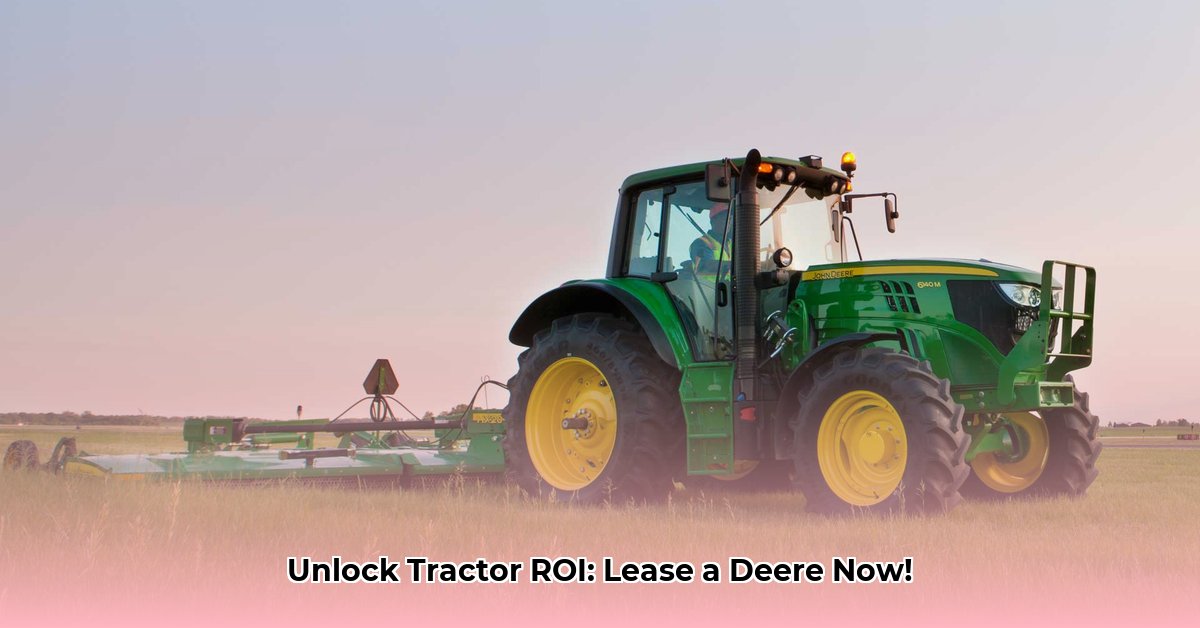
Leasing vs. Loans: A Detailed Comparison for Farmers
Choosing between leasing and financing a John Deere tractor is a crucial decision for any farmer. This guide provides a clear comparison to help you make the best choice for your operation. Both options have their advantages and disadvantages, making a thorough understanding essential for maximizing your return on investment (ROI). The right choice depends heavily on your farm's size, financial goals, and risk tolerance. For optimal tire pressure, check out this useful chart.
Key Differences: Loans vs. Leases
| Feature | Loan | Lease |
|---|---|---|
| Upfront Cost | Higher; requires a significant initial investment. | Lower; reduces initial financial burden. |
| Monthly Payments | Generally higher; covers principal and interest. | Typically lower; easier on short-term cash flow. |
| Ownership | You own the tractor after the loan is repaid. | You return the tractor at the lease's end. |
| Equity Building | Yes; each payment builds equity in the tractor. | No; you don't gain ownership or equity. |
| Maintenance | You are responsible for all maintenance and repairs. | Lease agreements often specify maintenance responsibilities; check the details carefully. |
| Tax Implications | Potential tax deductions (consult a tax professional). | Potential tax deductions (consult a tax professional). |
| Flexibility | More flexible terms; potential for adjustments. | Less flexible; terms are fixed in the lease agreement. |
Aren't lower monthly payments appealing? While leasing offers potentially lower monthly payments, consider the long-term implications. Would the total cost over the lease period exceed the total cost of a loan?
Factors Influencing Your Decision
Several factors should guide your choice. Consider these carefully before making a commitment:
Farm Size and Type: Larger, established farms may benefit more from loan ownership due to long-term cost savings and equity building. Smaller or newer farms might prefer leasing to manage short-term cash flow.
Financial Goals: Short-term goals often align with leasing due to lower upfront costs. If long-term equity building and ownership are priorities, a loan is usually better.
Cash Flow: Analyze your farm's cash flow projections. Can you comfortably handle a larger upfront investment and higher monthly payments associated with a loan? Tight cash flow may favor leasing's predictable payments.
Risk Tolerance: Loans carry more financial risk, but also offer higher potential returns. Leasing is less risky as it reduces the depreciation burden, but eliminates potential equity gains.
Long-Term Sustainability: Leasing allows access to newer technology, potentially improving efficiency and sustainability. Ownership fosters a focus on long-term maintenance, minimizing the environmental impact and promoting cost efficiency. How do these factors align with your farm's long-term plans?
Securing Financing: A Step-by-Step Guide
Research Financing Options: Explore John Deere Financial and other agricultural lenders. Compare interest rates, terms, and additional services.
Pre-Qualification: Get pre-qualified for financing to understand how much you can borrow. Knowing your borrowing power clarifies your search.
Choose Your Tractor: Select a tractor that meets your needs and fits within your pre-approved budget.
Complete the Application: Gather required documents (income statements, tax returns) and diligently complete the loan or lease application.
Negotiate Terms: Don't hesitate to negotiate interest rates, payment schedules, and other terms.
Review and Sign: Carefully review all paperwork before signing any agreements. Seek professional advice if needed.
Did you know that proactive financial planning can increase your chances of loan approval significantly? Preplanning and understanding financial implications significantly improves the process.
Conclusion: Making Informed Choices
Securing the right financing is crucial for your farm's success. This guide provides essential information, but remember to consult with a financial advisor specializing in agriculture. They'll provide personalized guidance, tailoring a financial plan to your specific circumstances. Remember, proper financial planning is a key ingredient in long term success and sustainability.
Resource Section:
- John Deere Financial
- [Relevant Government Agencies (Example: USDA)] (Insert relevant links here)
- [Agricultural Finance Resources (Example: Farm Credit Services)] (Insert relevant links here)